Bill of Rights Amendments and Judicial System
VerifiedAdded on 2019/09/20
|5
|631
|120
Essay
AI Summary
This essay delves into the impact of the Bill of Rights, specifically the 4th, 5th, 6th, and 8th Amendments, on the judicial system. It explains how these amendments aim to ensure fair treatment for individuals, even those suspected or arrested for crimes. The essay further discusses the effects of the Fourth Amendment, which protects against unreasonable searches and seizures, highlighting both its positive impact on individual privacy and its potential negative impact on law enforcement. The conclusion reflects on the balance between individual rights and the effective functioning of the judicial system, suggesting that while these rights are important, they may also create opportunities for criminals to evade justice.
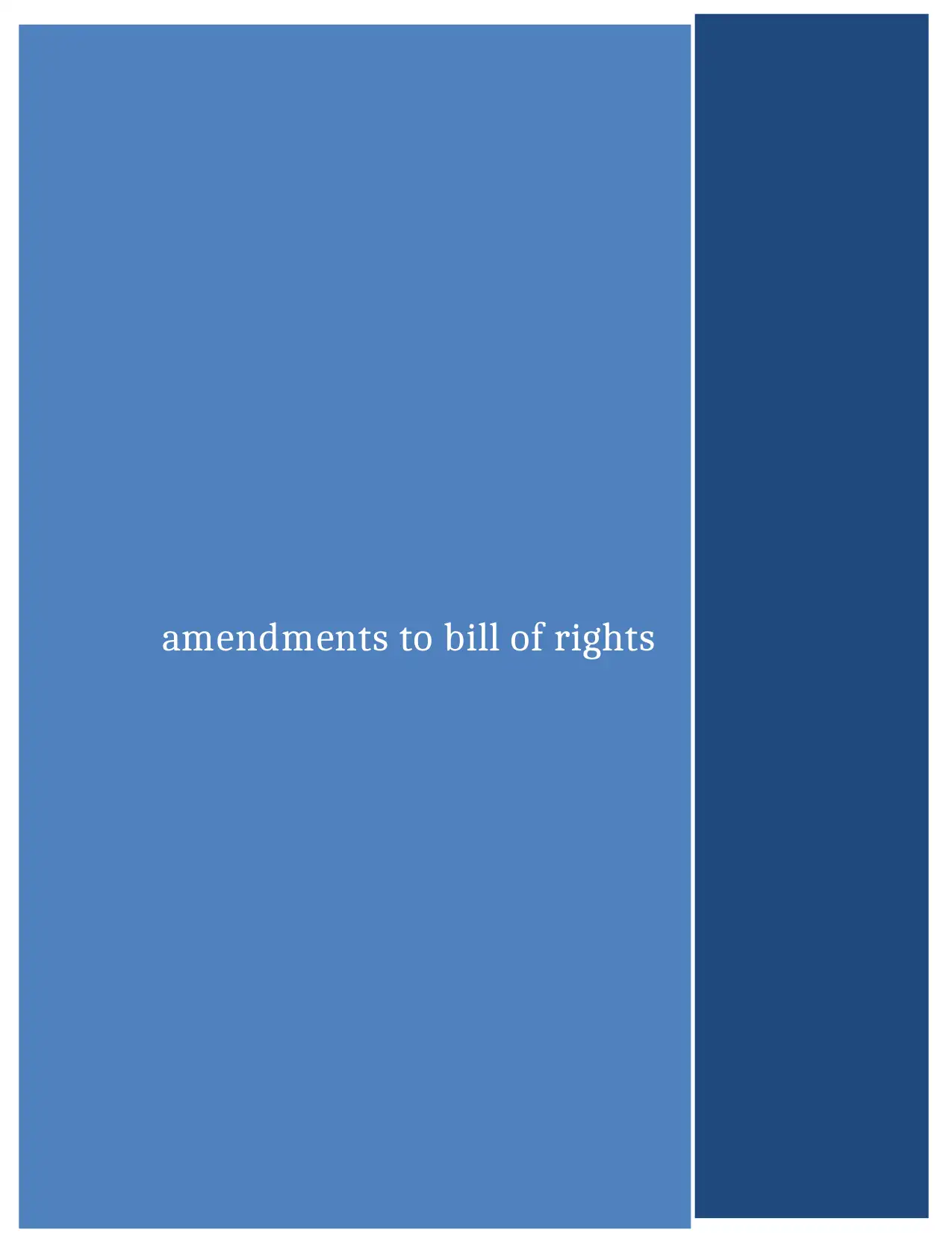
amendments to bill of rights
Paraphrase This Document
Need a fresh take? Get an instant paraphrase of this document with our AI Paraphraser
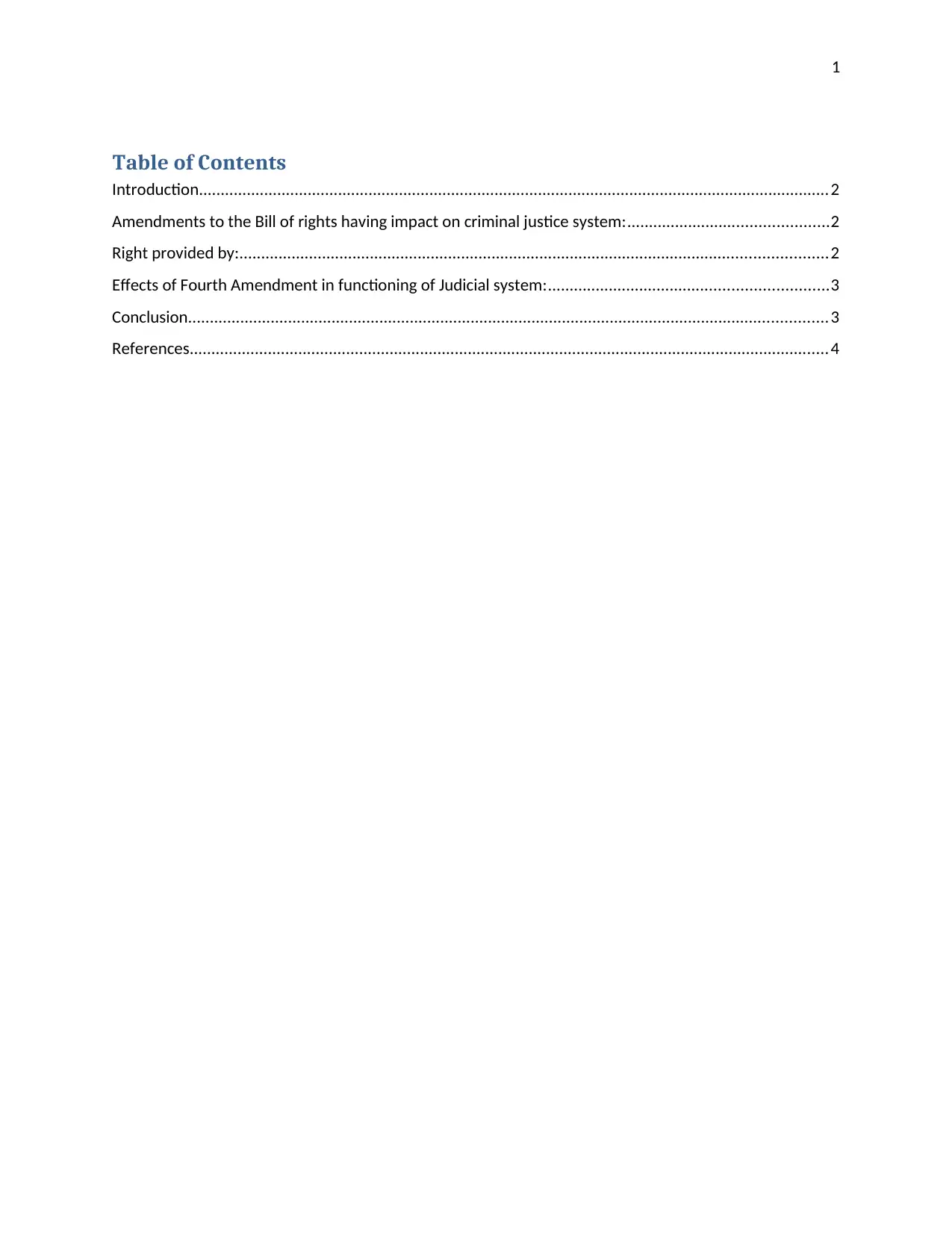
1
Table of Contents
Introduction.................................................................................................................................................2
Amendments to the Bill of rights having impact on criminal justice system:..............................................2
Right provided by:.......................................................................................................................................2
Effects of Fourth Amendment in functioning of Judicial system:................................................................3
Conclusion...................................................................................................................................................3
References...................................................................................................................................................4
Table of Contents
Introduction.................................................................................................................................................2
Amendments to the Bill of rights having impact on criminal justice system:..............................................2
Right provided by:.......................................................................................................................................2
Effects of Fourth Amendment in functioning of Judicial system:................................................................3
Conclusion...................................................................................................................................................3
References...................................................................................................................................................4
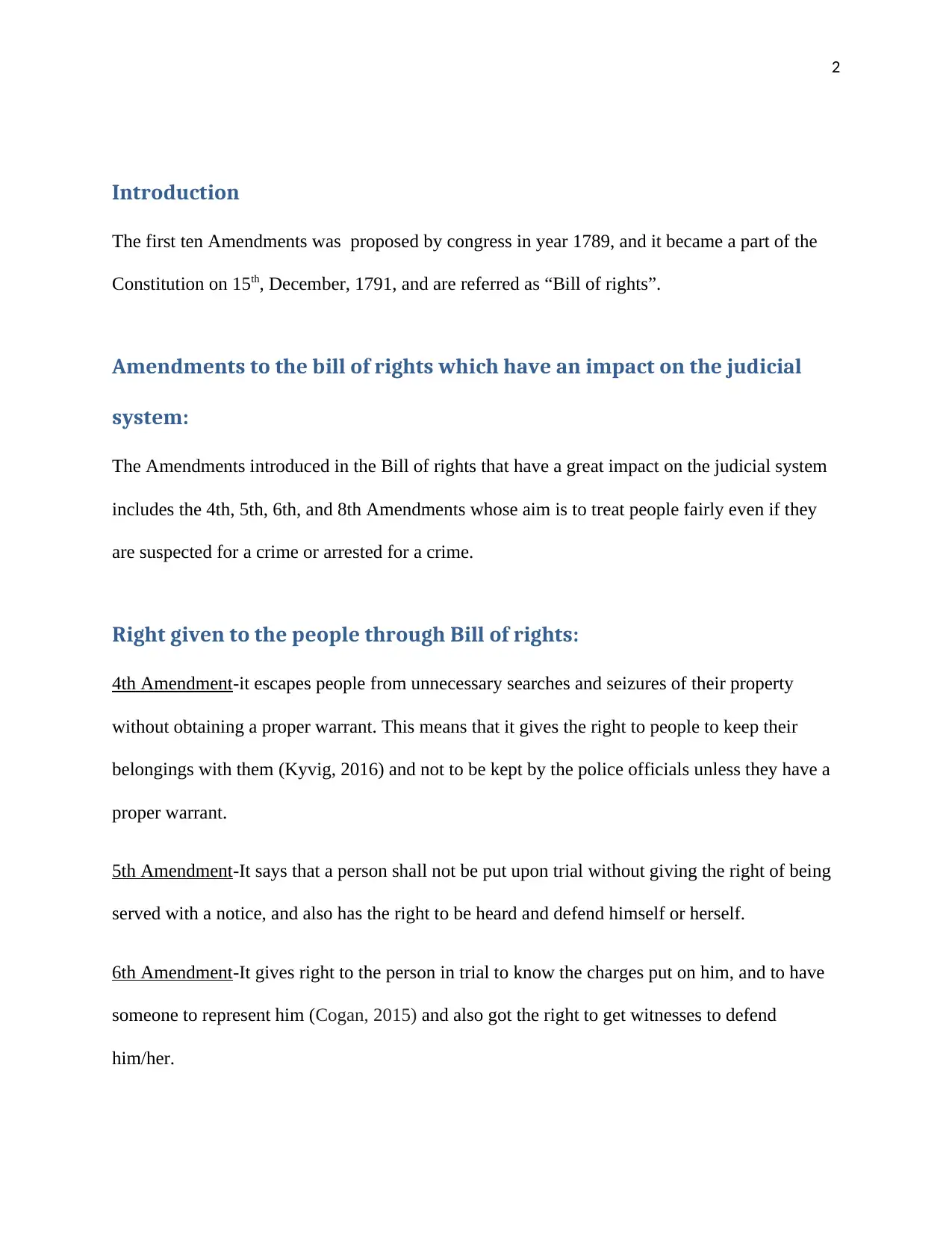
2
Introduction
The first ten Amendments was proposed by congress in year 1789, and it became a part of the
Constitution on 15th, December, 1791, and are referred as “Bill of rights”.
Amendments to the bill of rights which have an impact on the judicial
system:
The Amendments introduced in the Bill of rights that have a great impact on the judicial system
includes the 4th, 5th, 6th, and 8th Amendments whose aim is to treat people fairly even if they
are suspected for a crime or arrested for a crime.
Right given to the people through Bill of rights:
4th Amendment-it escapes people from unnecessary searches and seizures of their property
without obtaining a proper warrant. This means that it gives the right to people to keep their
belongings with them (Kyvig, 2016) and not to be kept by the police officials unless they have a
proper warrant.
5th Amendment-It says that a person shall not be put upon trial without giving the right of being
served with a notice, and also has the right to be heard and defend himself or herself.
6th Amendment-It gives right to the person in trial to know the charges put on him, and to have
someone to represent him (Cogan, 2015) and also got the right to get witnesses to defend
him/her.
Introduction
The first ten Amendments was proposed by congress in year 1789, and it became a part of the
Constitution on 15th, December, 1791, and are referred as “Bill of rights”.
Amendments to the bill of rights which have an impact on the judicial
system:
The Amendments introduced in the Bill of rights that have a great impact on the judicial system
includes the 4th, 5th, 6th, and 8th Amendments whose aim is to treat people fairly even if they
are suspected for a crime or arrested for a crime.
Right given to the people through Bill of rights:
4th Amendment-it escapes people from unnecessary searches and seizures of their property
without obtaining a proper warrant. This means that it gives the right to people to keep their
belongings with them (Kyvig, 2016) and not to be kept by the police officials unless they have a
proper warrant.
5th Amendment-It says that a person shall not be put upon trial without giving the right of being
served with a notice, and also has the right to be heard and defend himself or herself.
6th Amendment-It gives right to the person in trial to know the charges put on him, and to have
someone to represent him (Cogan, 2015) and also got the right to get witnesses to defend
him/her.
⊘ This is a preview!⊘
Do you want full access?
Subscribe today to unlock all pages.

Trusted by 1+ million students worldwide
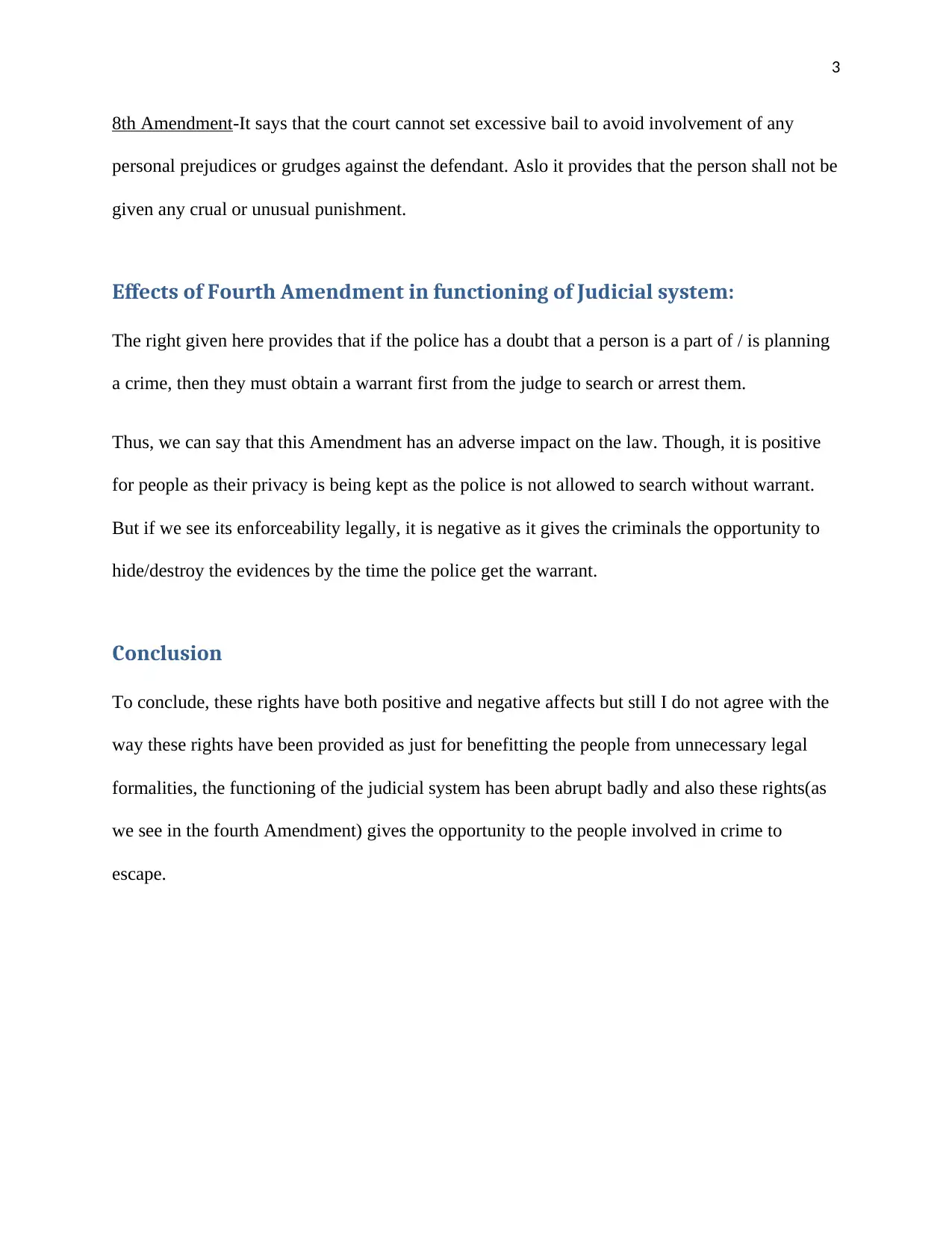
3
8th Amendment-It says that the court cannot set excessive bail to avoid involvement of any
personal prejudices or grudges against the defendant. Aslo it provides that the person shall not be
given any crual or unusual punishment.
Effects of Fourth Amendment in functioning of Judicial system:
The right given here provides that if the police has a doubt that a person is a part of / is planning
a crime, then they must obtain a warrant first from the judge to search or arrest them.
Thus, we can say that this Amendment has an adverse impact on the law. Though, it is positive
for people as their privacy is being kept as the police is not allowed to search without warrant.
But if we see its enforceability legally, it is negative as it gives the criminals the opportunity to
hide/destroy the evidences by the time the police get the warrant.
Conclusion
To conclude, these rights have both positive and negative affects but still I do not agree with the
way these rights have been provided as just for benefitting the people from unnecessary legal
formalities, the functioning of the judicial system has been abrupt badly and also these rights(as
we see in the fourth Amendment) gives the opportunity to the people involved in crime to
escape.
8th Amendment-It says that the court cannot set excessive bail to avoid involvement of any
personal prejudices or grudges against the defendant. Aslo it provides that the person shall not be
given any crual or unusual punishment.
Effects of Fourth Amendment in functioning of Judicial system:
The right given here provides that if the police has a doubt that a person is a part of / is planning
a crime, then they must obtain a warrant first from the judge to search or arrest them.
Thus, we can say that this Amendment has an adverse impact on the law. Though, it is positive
for people as their privacy is being kept as the police is not allowed to search without warrant.
But if we see its enforceability legally, it is negative as it gives the criminals the opportunity to
hide/destroy the evidences by the time the police get the warrant.
Conclusion
To conclude, these rights have both positive and negative affects but still I do not agree with the
way these rights have been provided as just for benefitting the people from unnecessary legal
formalities, the functioning of the judicial system has been abrupt badly and also these rights(as
we see in the fourth Amendment) gives the opportunity to the people involved in crime to
escape.
Paraphrase This Document
Need a fresh take? Get an instant paraphrase of this document with our AI Paraphraser
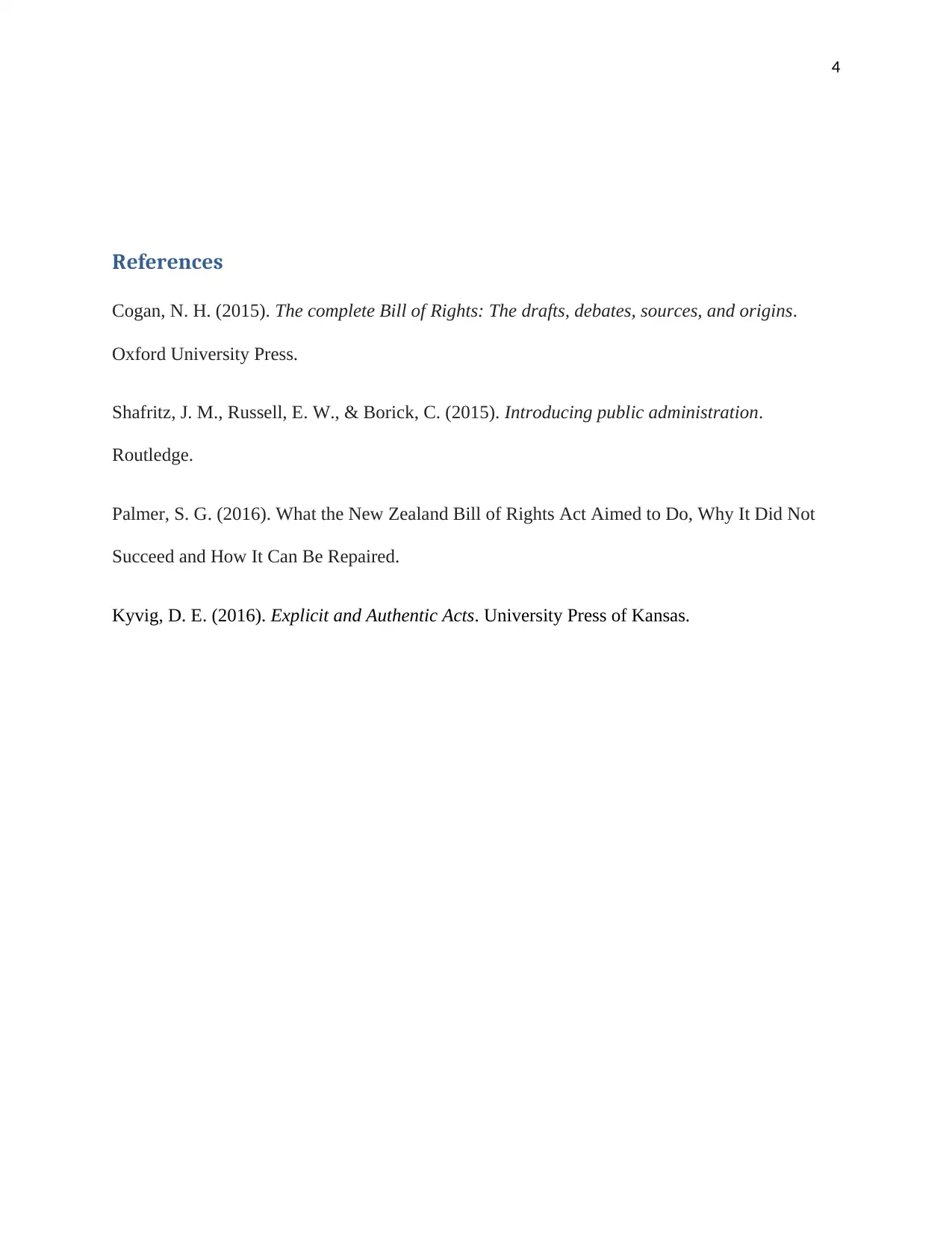
4
References
Cogan, N. H. (2015). The complete Bill of Rights: The drafts, debates, sources, and origins.
Oxford University Press.
Shafritz, J. M., Russell, E. W., & Borick, C. (2015). Introducing public administration.
Routledge.
Palmer, S. G. (2016). What the New Zealand Bill of Rights Act Aimed to Do, Why It Did Not
Succeed and How It Can Be Repaired.
Kyvig, D. E. (2016). Explicit and Authentic Acts. University Press of Kansas.
References
Cogan, N. H. (2015). The complete Bill of Rights: The drafts, debates, sources, and origins.
Oxford University Press.
Shafritz, J. M., Russell, E. W., & Borick, C. (2015). Introducing public administration.
Routledge.
Palmer, S. G. (2016). What the New Zealand Bill of Rights Act Aimed to Do, Why It Did Not
Succeed and How It Can Be Repaired.
Kyvig, D. E. (2016). Explicit and Authentic Acts. University Press of Kansas.
1 out of 5
Related Documents
Your All-in-One AI-Powered Toolkit for Academic Success.
+13062052269
info@desklib.com
Available 24*7 on WhatsApp / Email
![[object Object]](/_next/static/media/star-bottom.7253800d.svg)
Unlock your academic potential
Copyright © 2020–2025 A2Z Services. All Rights Reserved. Developed and managed by ZUCOL.




